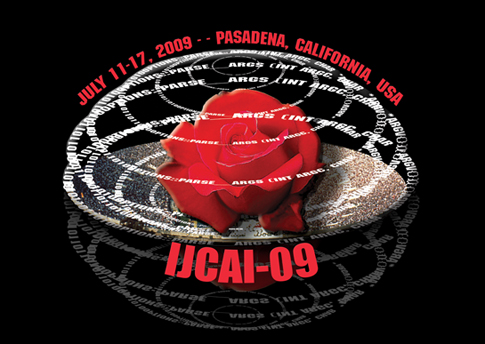
Abductive & Inductive Knowledge Development
Pasadena, California, USA
12th July, 2009

 |
IJCAI'09 Workshop on Abductive & Inductive Knowledge Development Pasadena, California, USA 12th July, 2009 |

|
| ABSTRACT |
|
This Workshop will explore new ways of using logic-based methods to support the evolution of knowledge in real-world problems. In particular, it will focus on the integration and application of abductive and inductive inference to tasks where theories must evolve incrementally, in response to continued feedback from the user or domain being modelled. Drawing on analogies with methodology of science, we aim to explore and build upon recent work in the mechanisation of theory revision, hypothesis evaluation, and the design of experiments. In this way, we will provide an inter-disciplinary forum for researchers seeking to formalise and automate such knowledge development cycles in various disciplines (scientific, applied, cognitive or philosophical). |
| PROGRAMME | ||||||||||||||||||||||||||||||||||||||||||||||||||||||||||||||||||||||||||||||||||||||||||||||||||||||||||||||||||||||||||||||
|
| OVERVIEW |
|
Background: Abduction and induction are forms of logical inference with many applications in AI. Abduction is a type of explanatory-based reasoning appropriate for tasks such as planning and diagnosis. Induction is a type of generality-based reasoning appropriate for tasks like classification and learning. The nature and relation of abduction and induction has been explored from logical and philosophical perspectives in a recent book Abduction and Induction: Essays on their Relation and Integration. More advanced aspects were investigated in a series of three subsequent workshops AIAI'05, AIAI'06, and AIAI'07, which have shown that abduction and induction can be usefully combined and cooperatively deployed in a number of expressive knowledge representation and reasoning frameworks. Motivation: Many studies have now confirmed the utility of integrating abduction and induction. But recent experience in applying such approaches to real-world problems is beginning to suggest that even greater benefits might be achieved by incorporating these techniques into a more refined cycle of knowledge development where domain theories evolve incrementally in response to continued feedback from the user or domain being modelled. This has resulted in several (as yet independent) attempts to formalise and, in some cases, automate such knowledge development cycles in various target applications. For example:
These tasks go beyond classical applications of abduction and induction by interleaving theory revision with user or domain interaction. In common with the methodology of scientific knowledge development, they actively seek feedback to validate and improve their world model. By contrast, most related works on hypothetical inference do not attempt to close the cycle of knowledge revision. Instead, given a theory T and examples E, they simply compute a set of candidate hypotheses H that entail E with respect to T. But, while hypothesis generation is a key part of the process, this workshop is based on the premise that real applications also demand some practical way of narrowing down the set of candidate hypotheses H, and of using them to actually adopt a revised theory T' while also guiding the search for new examples E'. This requires some form of interaction with the domain or user. Aims: The Workshop aims to better understand how abduction and induction can be used within a continuous cycle of knowledge development. It also aims to examine possible application areas and to investigate how the revision cycle can be better supported by computational tools. We are especially keen to explore analogies between knowledge development and scientific discovery, drawing particular attention to the complementary roles of theories, hypotheses and experiments. We would also like to exploit possible links with belief updates in multi-agent systems and knowledge assimilation frameworks. A important goal of the Workshop is to stimulate the transfer of ideas between different target domains and to establish a cross-disciplinary research agenda in this area to advance the application of logical modelling and inference to problems situated in the real world. Focus: The Workshop will focus on issues associated with the use of abduction and/or induction to support multiple iterations of the knowledge development cycle. Key topics of interest include (but are not limited to)
While these topics necessarily include some non-logical considerations, they also pose some very interesting problems which can be stated in purely logical terms. For example, how can nonmonotonic inference be used as practical basis for belief revision? How can we efficiently identify testable predictions that differ between two theories? How can we formalise theoretical and observational aspects of a domain so that experiments can be automatically designed in order to test such predictions? Is there any rational way of extracting useful information from (or in some way combining) the multitude of hypotheses typically returned in real applications. We believe these questions must be addressed in order to substantially advance the successful application of logic-based methods to problems in AI. Possible areas of application include, but are not limited to, modelling in systems biology, social science, natural language processing, and software engineering. The Workshop will also aim to examine the links to other approaches (philosophical or cognitive) for modelling scientific and other domains. Audience: The Workshop is likely to be of interest to researchers in AI, machine learning, logic programming, consequence finding, active learning, belief revision, model based reasoning, cognitive modelling, scientific discovery, hypothesis testing, process modelling, ethnography, linguistics, ontologies, bioinformatics, and the philosophy of science. We anticipate the Workshop will also be relevant to real-world applications of these fields. We welcome contributions from any other disciplines that might advance the aims of our Workshop. |
| POST-PROCEEDINGS |
|
Participants are invited to submit revised and extended versions of their papers to a special issue in the Journal of Logic and Computation. |
| REGISTRATION |
|
The Workshop is subject to regular IJCAI'09 workshop registration procedures and fees. |
| IMPORTANT DATES | ||||||||||||||||
|
| ORGANISING COMMITTEE | |||
|
| PROGRAMME COMMITTEE | ||||||||||
|
| (c) Oliver Ray, last updated 24/01/2010 |